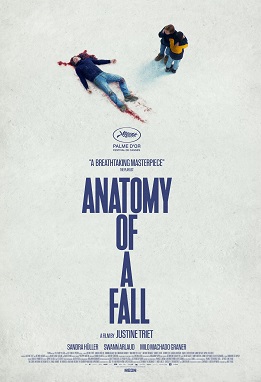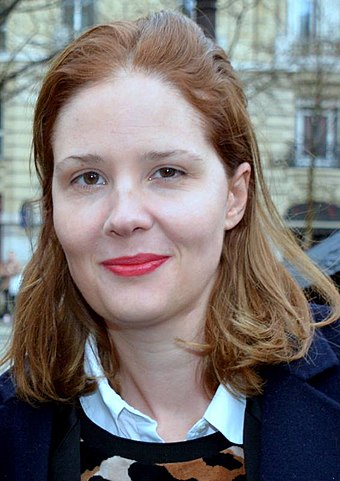

Anatomie d'une chute (Justine Triet, 2023) wr. Justine Triet, Arthur Harari; prod. Marie-Ange Luciani, David Thion; dp Simon Beaufils; Sandra Hüller, Swann Artaud, Milo Machado Graner; won Palme d'Or at VIFF23
In an isolated mountain chalet near Grenoble, Samuel Maleski is playing music in his attic so loudly that his wife, novelist Sandra Voyter, asks to reschedule with the female student interviewing her. Their son, Daniel, returns from a long walk with his guide dog Snoop to find Samuel dead below his attic window. Talking to an old friend, lawyer Vincent Renzi, she says the fall must have been accidental.

This is an excellent courtroom drama film. One of the minor things that interested me was that Sandra Hüller’s character speaks English through most of the film, and never the actress's native German - not one word. There are long exchanges in which she speaks English and another character speaks French and they understand each other perfectly and fluently. Another minor matter I wondered about: is this an accurate representation of a trial in France? I assume it is. It is so different from English courtrooms.
Hüller is also in The Zone of Interest. She’s having a very successful year.
The problem as I, idiosyncratically, see it, is that the essential aspect that makes this film such a success with critics is also that which reduces it as a human document. It is written that Sandra Hüller asked Justine Triet during production whether her character did or did not 'do it'. Triet answered that she did not know. It's fine for the effect of the film if the audience does not know. Think of the enduring success of The Turn of the Screw, both book and films. However, I think I saw Hüller acting as if her character also did not know, whereas of course Sandra Voyter, in the fiction, does of course know. So there's a contradiction produced by an actress actually playing against her own character. I was uncomfortable throughout the film, and that discomfort still interferes with a satisfactory resolution in my mind.
Peter Bradshaw:
The film does not signpost the traditional twists and turns and dramatic reversals, but keeps a cool distance, letting us wonder if Sandra is guilty or not, and we are kept guessing until the end. It’s a lowkey, almost downbeat drama, but with something invigoratingly cerebral. The Guardian.
Wendy Ide:
Perhaps more than most genres, the courtroom drama succeeds or fails on the strength of its screenplay. And here, with its layered and rewardingly intricate script co-written by Triet and her husband, Arthur Harari, this solid, unshowy film excels. Nodding to courtroom dramas such as Kramer vs Kramer and Otto Preminger’s Anatomy of a Murder (an inspiration in more than just title), and to the more recent example of Alice Diop’s compelling Saint Omer, it’s a slippery thing, a teasingly complex framework that repeatedly tips the audience off balance and taps into our biases and assumptions.
A genre that can be prone to stuffiness and overly waffly dialogue, the courtroom drama here is electric, restlessly dynamic and compulsively watchable, with only a few rare moments in which the film’s throttling hold on the audience loosens. It’s a considerable step up for Triet, whose previous work includes the frothy, more overtly comic In Bed With Victoria and the uneven character study Sibyl. The Guardian.
Mark Hanson:
Thankfully, the script has still built up enough goodwill at this point to mostly forgive the way that the film devolves into a generic courtroom drama. At its best, Anatomy of a Fall is nothing less than a rigorous modern treatise on the knotty interpersonal dynamics of long-term relationships and how conveniently they can be distorted when exposed to public scrutiny. Slant.
IMDb page.
Wikipedia page.
Second photo is that of Justine Triet, from Wikipedia.
Garry Gillard | New: 4 January, 2024 | Now: 1 March, 2024